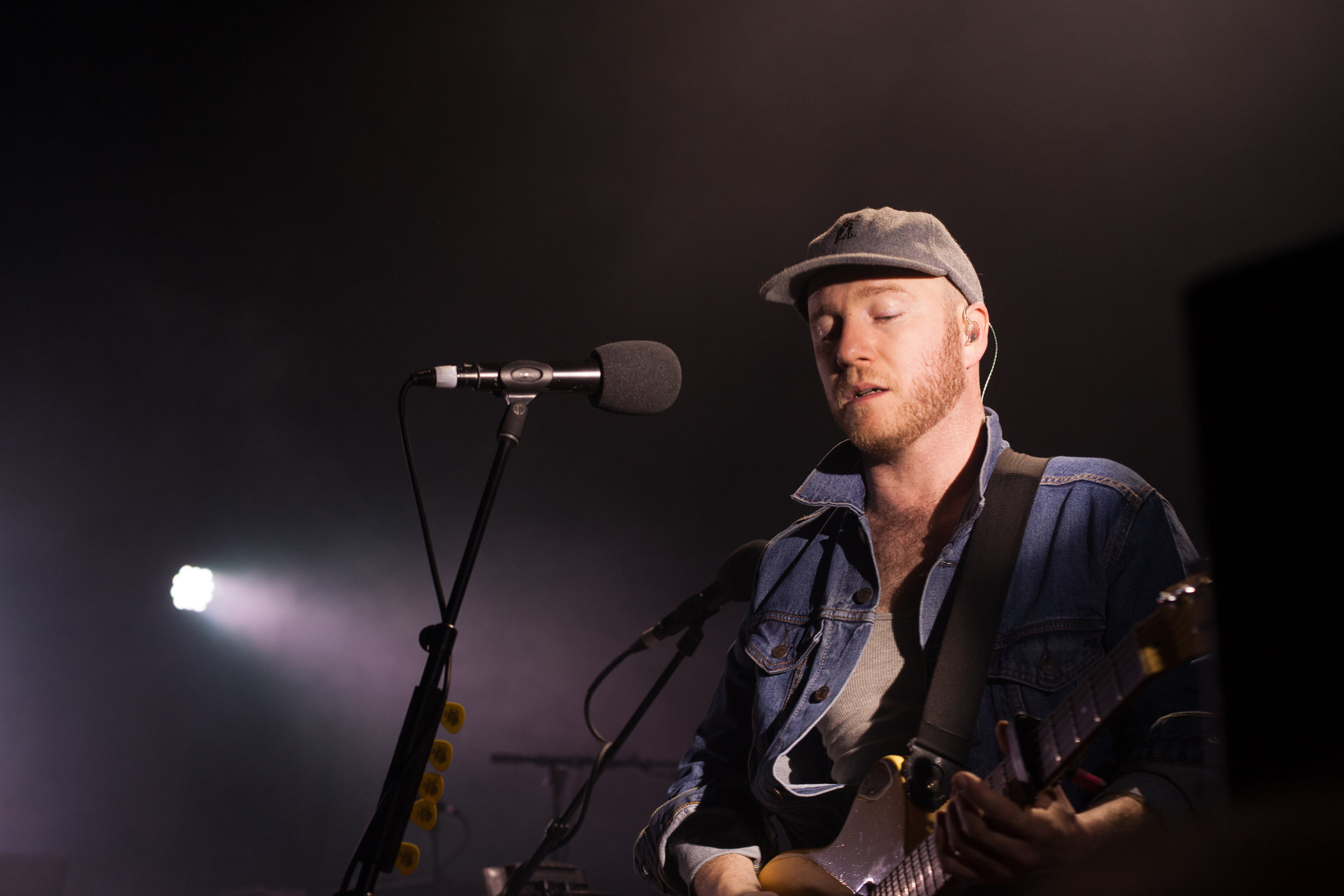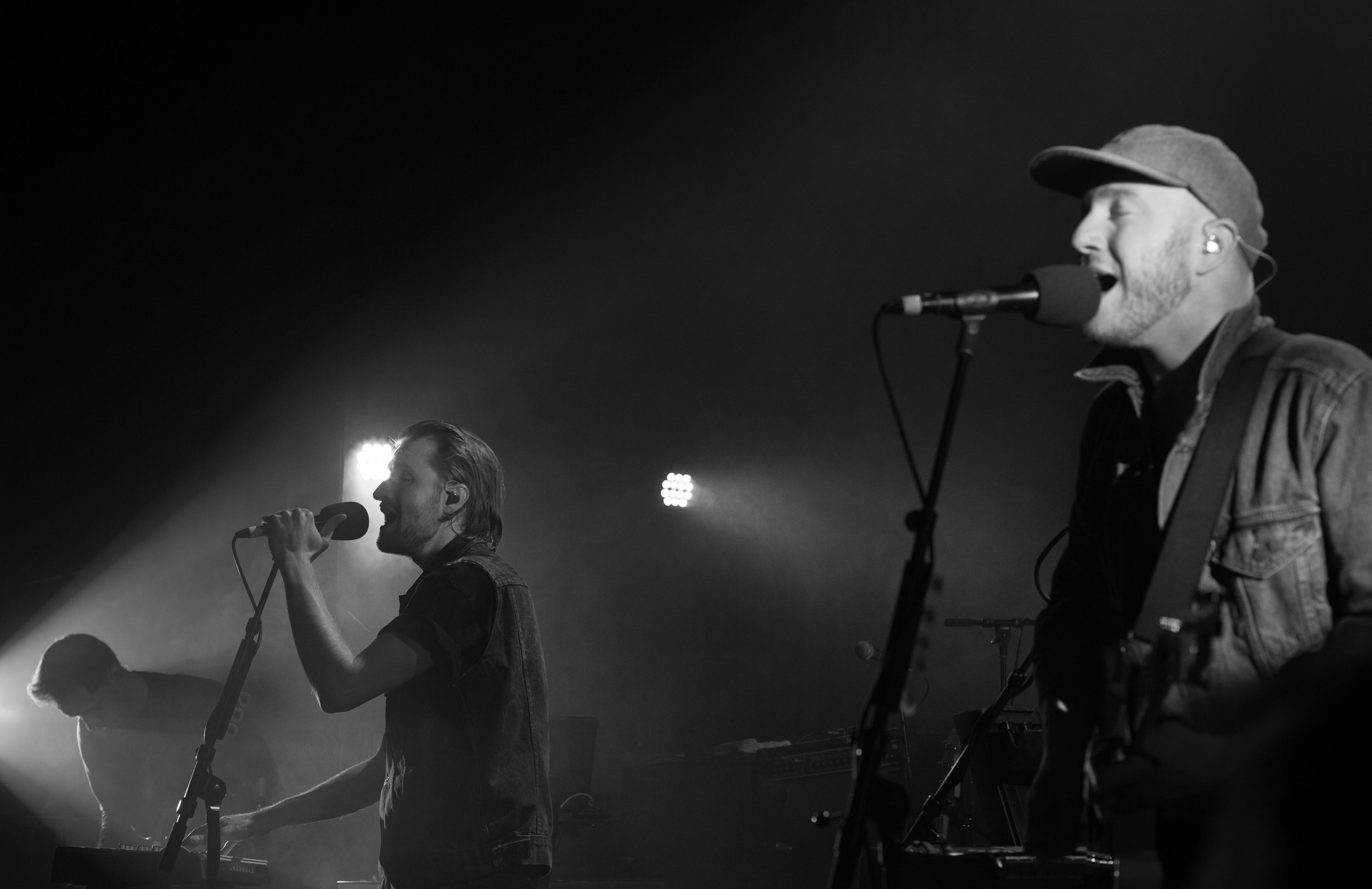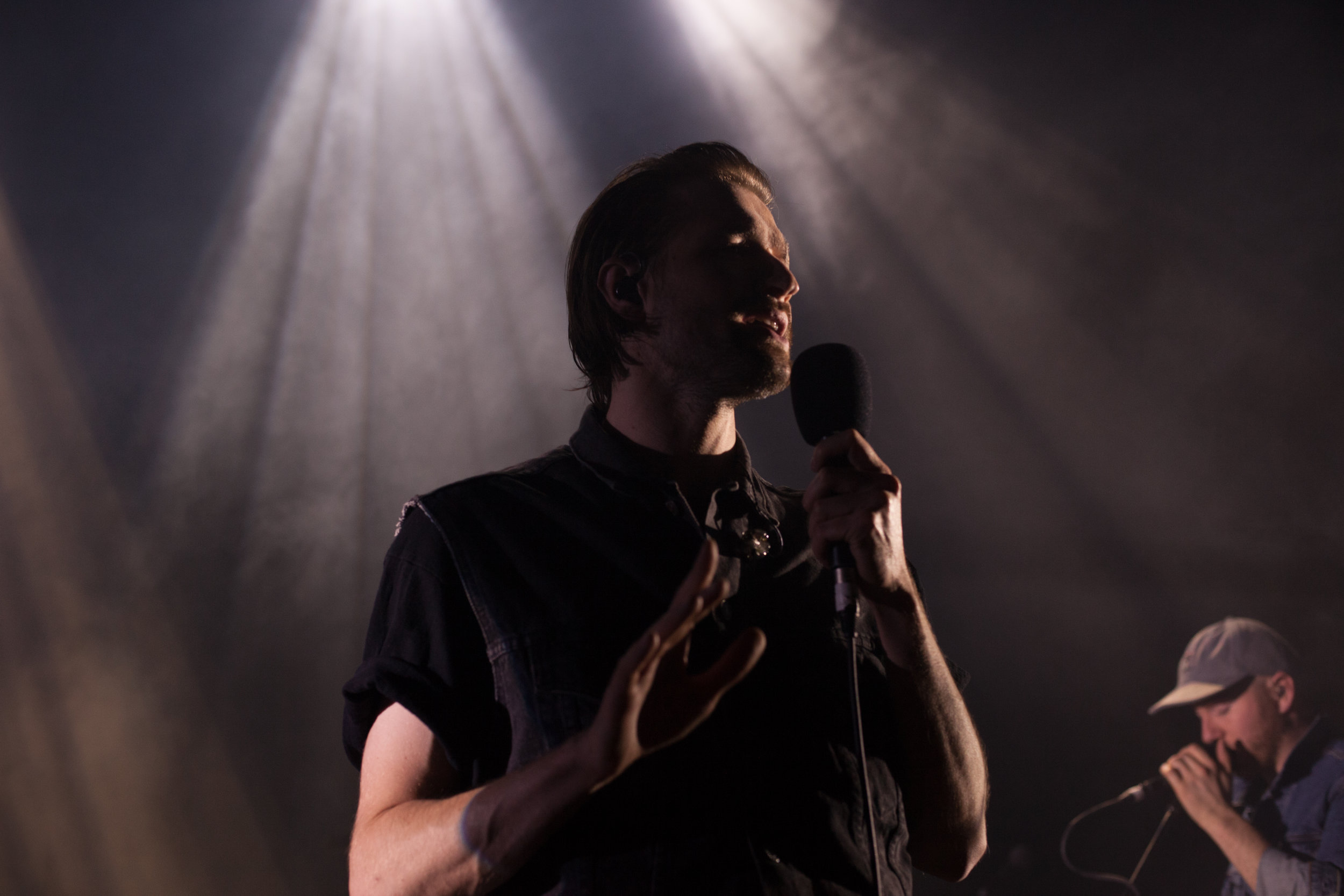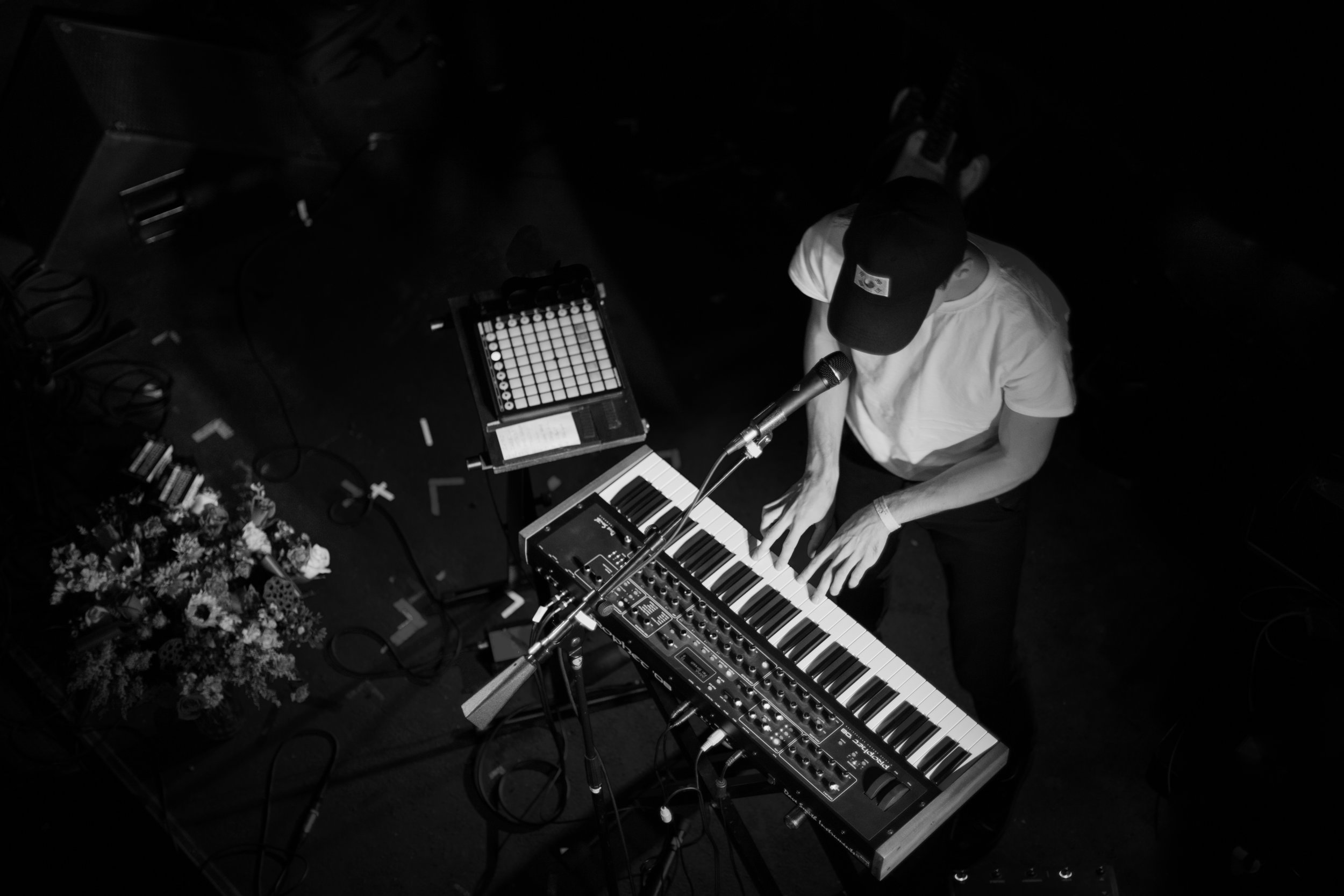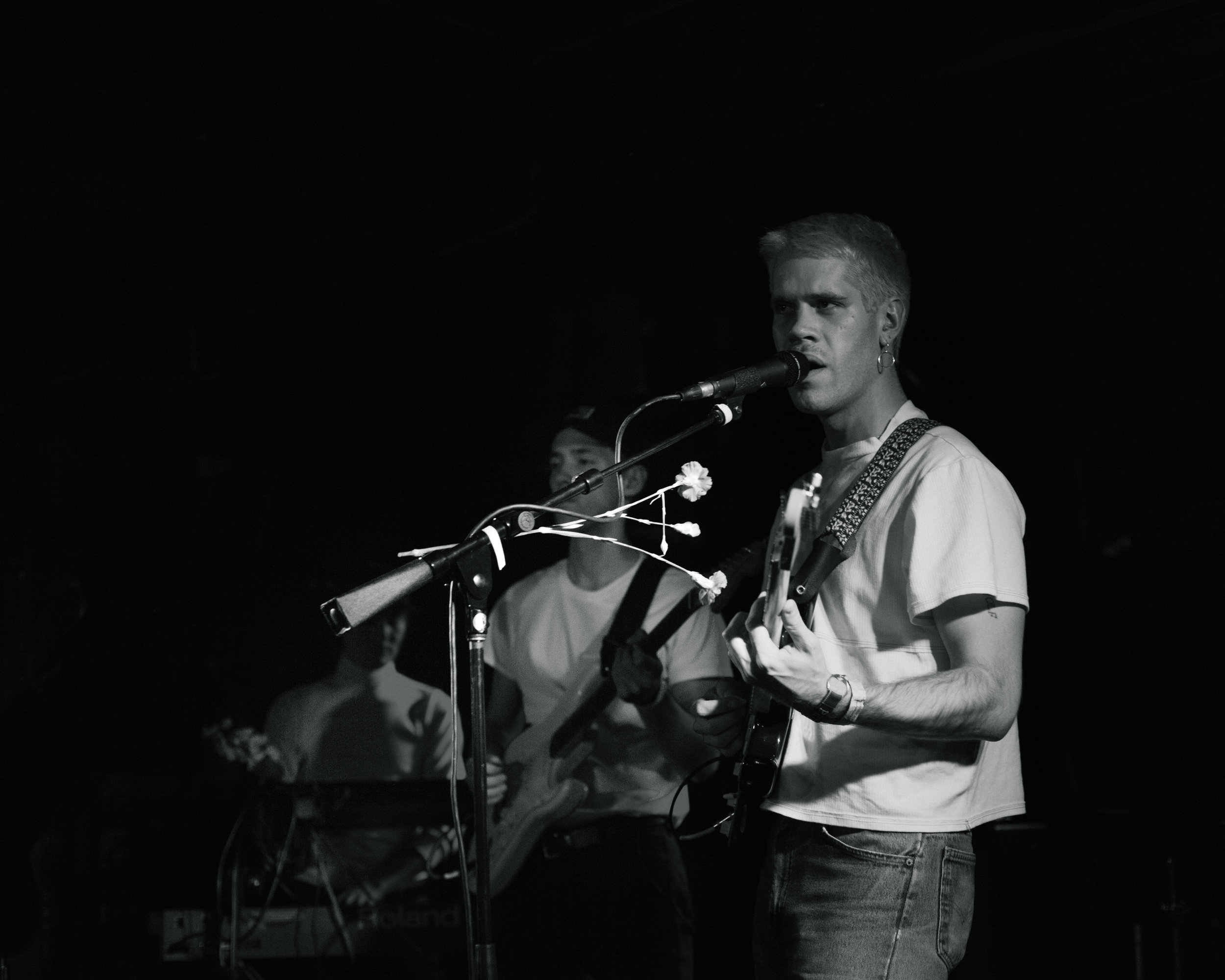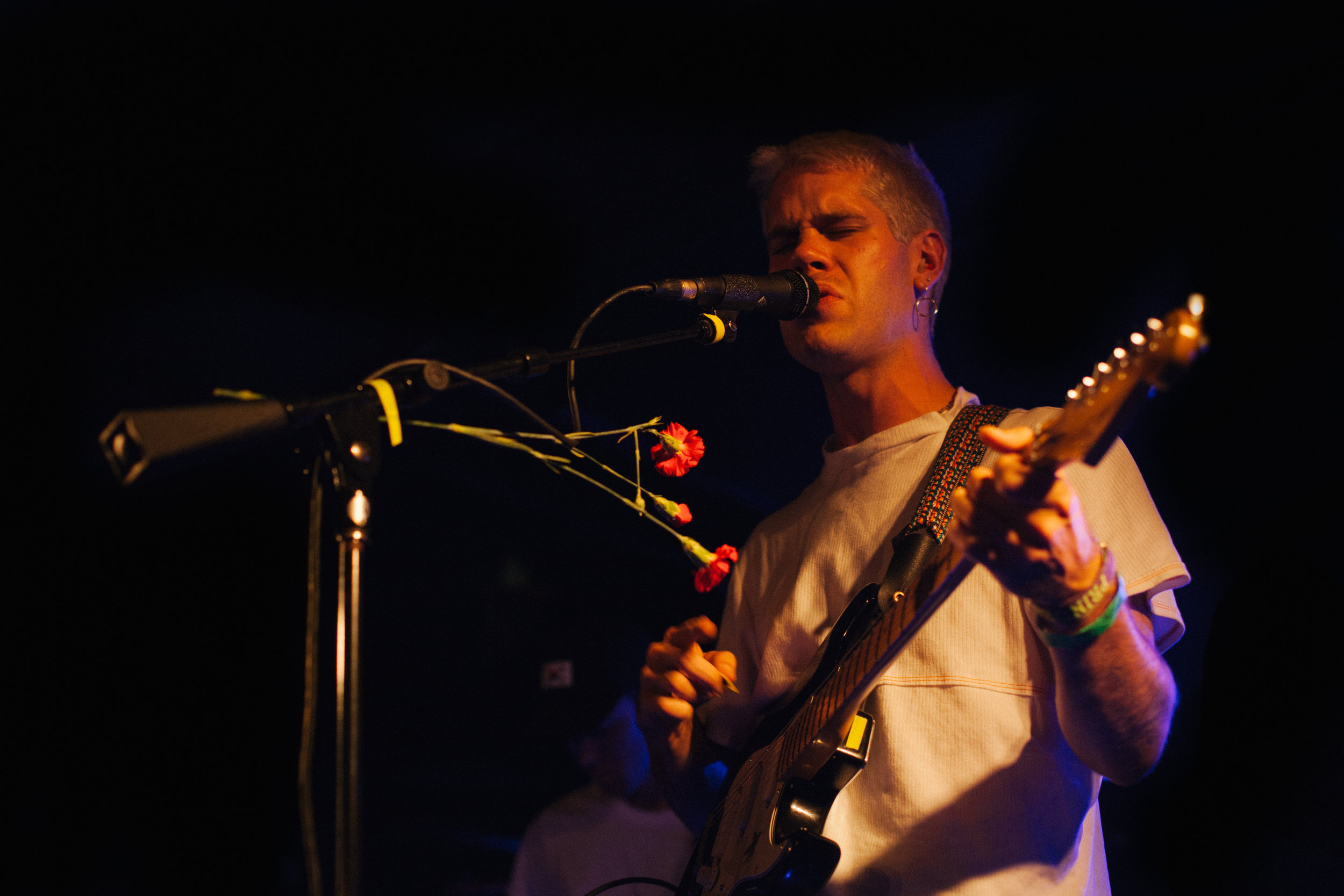"You wouldn't know it but you're really in your prime," coos the opening line of Warpaint's latest release, 2016's Heads Up. That sentiment, along with the band's first single to chart in the US, "New Song," has lead the aptly named album as a bold statement from a group of artists now fully embracing the sort of tight, danceable pop they had only flirted with before.
Warpaint's meandering art rock has always been equal parts groovy and moody, though this third full length sees Emily Kokal (vocals, guitar), Theresa Wayman (guitar, vocals), Jenny Lee Lindberg (bass, vocals), and Stella Mozgawa (drums) hone their craft into its most accessible form yet. In the year following its release, Heads Up has gone on to result in, among other things, an opening slot on Depeche Mode's global Spirit tour, and even an awkward encounter with Shia LaBeouf, though the album was nearly never made at all.
Following their recent performances at Chicago's Lollapalooza and Subterranean (pictured below), Transverso spoke with Wayman over the phone to discuss this and more, catching her in a particularly zen moment immediately following a session with Depeche Mode's tour masseuse.





TRANSVERSO: What's it like touring with Depeche Mode?
THERESA WAYMAN: It [has been] incredibly fun, and it is such an honor to be opening for them. The reality of it didn't quite hit me until we got to that first venue – they have this whole world that they set up. They weren't one of my main influences growing up, so I have appreciated the magnitude of what was happening this whole time, but I didn’t quite get it as much as Jen, who has been heavily influenced by them.
With Heads Up being about a year old now, how has your perception of it and what you accomplished changed over the course of that time?
Well I'm still really proud of the album, and I think I'm I am even more proud of it than I was when it came out because I've got some distance and I realized some of the things that I was stressing over weren't as big a deal as I had thought at the time. It’s nice to have that experience, as opposed to [feeling] like something still isn't right. I just feel really at peace with that album. I like it a lot, and I don't listen to it that often. I don't really listen to any of our recorded music that much, but I feel like they’re some of our strongest songs, and I love playing them live.
I feel as though they walk the line of being accessible and yet their own unique thing. I think we have other songs and other albums that do that too, but as a whole I think we accomplish that more with this album and I appreciate that. That's pretty much been my goal with writing music for a while now; to kind of figure out how to perfectly be obscure yet understood. I don't know why I have that drive, but I do. I think some artists are completely okay with not being understood, that's not their objective. Other artists really want 100% to be in the mainstream and be understood. I just like finding the balance somewhere in between.
Heads Up does seem decidedly dancier, poppier and more accessible than your past work in some ways yet still does a great job of maintaining your kind of signature vibe and brooding quality. How much of that was you know a conscious will to adapt and how much of that is just a natural evolution?
It's just a natural evolution for me, personally. Like I was saying, I really feel a drive to be understood and not to be too left that only a small percentage of people understand it. I think that you can be unique and individual and still be understood if you work and find a perfect channel for that. So I guess that was a conscious effort to be that way. “New Song” is quite a bit more accessible than anything [we had previously done], but even if you have a song that has a weird abstract kind of format, like “By Your Side” or “So Good,” I think it's great to still be vivid in the sounds and choices of guitar lines and bass lines and how long you're staying in a section. I wanted all that to be really succinct and really vivid even if there was an odd structure that you're playing off of.
I remember hearing you originally planned to release these songs as kind of a series of singles instead of as a full record. What changed that ultimately resulted in this album coming to be?
Well we started writing these songs with that in mind, but we weren't all on the same page about that, actually. It ended up being that certain people needed more time away to not be writing, [so] you didn't want the pressure of that. So some songs got written during that time, either individually or off in pairs, and then we just kind of kept them and didn't act on finishing them. Then we just decided we would just come together and do an album, and then that made more sense. But that idea is still out there and lingering for us, and I think that we might try to do that. We actually have already written a couple of songs over the summer, and we're going to continue while we’re on this tour.
We have a lot of downtime on the tour – well, more than normal – because of Depeche Mode. They have the luxury of being able to [take days off in between shows], which is not what we [usually] do, so we have some time to write together. We're just going to collect songs and see what happens, and maybe do some individual releases or an EP or two. I think we want to just create more content for ourselves and keep putting music out but not have to have it be this one big project, and just try a little bit of a different approach.
This album was produced by Jake Bercovici (Julian Casablancas + The Voidz), whom you also worked with on your debut EP, 2008’s Exquisite Corpse. Was this a sort of full circle moment?
Yeah, definitely. He's grown a lot since then and so have we. We co-produced it – a lot of this stuff was actually produced on our own in our own studios. Stella and I started “So Good” – the bass and original electronic drum beat [and] Jen’s guitar [were] originally all recorded at Stella’s house. We all have these kind of set-ups in our places and we've been using them, so that was our own production. Same with “New Song.” And then there were things added once we went into the studio and all of us decided to finish this album and finish the songs, so it really was a collaborative production.
But it was definitely full circle working with him and realizing that when you start with something that works for you why not stay with that thing, you know? That became really evident, it was like coming home. I think we're going to continue to do this because we already have too many minds in this project and too many opinions to really add another, let alone someone that we don't know. Then we [would] all have to establish our own relationships with that person, otherwise we're not going to feel comfortable, and you have to feel comfortable when you're making music. I don't think I would really want to invite some unknown person in this scenario, at the moment it's already strenuous enough with our relationships. That being said, it’s good for us to have someone who's objective and can kind of police us a little bit and keep us happy and in check and even, because our band is really about being an even collaboration.
I appreciate how your live sets still include a surprisingly large amount of songs from the Exquisite Corpse EP, as bands don’t often perform much from nearly decade-old debut releases. That being said, you seem to only play one track off of your first full album, 2010’s The Fool. How do you decide what makes it to the stage in 2017?
Well there are many factors that go into picking them. One is we know there are certain songs that our audience likes more, so we pick those. We try to keep a pretty balanced set in terms of grabbing, like, two on average from each album, including the EP. Sometimes it gets weighted in another direction if, say, we know that somebody has really requested to hear “Stars,” but we also still want to play “Elephants” and “Beetles” as well. Then we'll have a debate about it, and every now and then it will just end up that we are playing three of those EP songs because somebody wants to hear “Stars.”
It's not usually weighted towards EP, per se, but we always play EP songs. And that's actually been happening a lot more recently, too, because we didn't for a while. We played “Elephants” pretty much our entire career as a live band, but “Stars” we didn't play for years. “Beetles” we didn't play for years. Those are the main ones. So then we started playing “Krimson,” and we just found a way to start the set with “Heads Up,” and then mashing up into “Krimson,” and so then that’s another EP song added. It works as a great start to the set, and then if you want to play “Beetles” and “Elephants” then you’ll have three songs again. So there are so many factors that go into it. So yeah, I think it's been heavier on EP lately, but it hasn't always been like that.
Has the live aspect of your music affected the writing or recording at all? Are you ever surprised by how a song is received live? I hear you’re starting to get mosh pits now.
Well the reason we made this album more dancey is because we like playing songs live that people dance to, and that we can dance to while we're playing them. I think that's one of my favorite things to do, so I would continue to want to make songs that have a pretty a good groove. We've had a couple of mosh pits. They always happen at the weirdest times. Or crowd surfing, [we’ve had’ people crowd surfing to “Undertow,” or one time it was “Set Your Arms Down,” this really heroin-y slow song. [Laughs] I never understand why or how when our fans start moshing, but it can get pretty rowdy sometimes.
In San Diego there was a fight and somebody got punched. We have some fans in the front row that get there early and stake out their spots, so if somebody comes and tries to take that spot that's not really a good scene. One time we were in Austin and Shia LaBeouf came to our show, and he made his way up towards the front, but he didn't realize that the people up there weren't just going to let him in. I don't even know if they knew who he was, but they were not happy, and so he kind of pushed out. That was another one of the tense moments that's funny.
That's hilarious. Did you recognize him from the stage at the time or did you find out after?
I didn't at first because he was wearing a hat and stuff. Then I saw the commotion and I was like ‘What's going on?’ It took me a couple of looks to see that it was him. I try not to get involved unless something really goes wrong because I don't want to stop the show.
Whenever I attend your shows they seem pretty peaceful. At Bonnaroo 2014 I remember there was a guy in the front row who wouldn't stop throwing roses at you.
Yeah, I remember that. [Laughs] That's nice, I don't mind that. People like to throw bras, too. That’s happened so many times.
I really enjoy playing live and I think one of the most important objectives to playing live show for a band is to make them dance and have a good time and maybe even do a mosh pit and stage dive. The shows that I've been to that I've enjoyed the most, that's what's happening. Like Little Dragon or Thee Oh Sees – I mean Thee Oh Sees just play nonstop. They go on, they just rule the whole time, and then they get off the stage. They don't do an encore, and the people, they’re just out of their minds. And that's the point. I don't really think that live music should be too heavy. I think it should be a physical body experience where you're just really enjoying yourself. I also enjoy going to The Fonda Theatre in L.A. where there's a balcony and you have seats and you just sit and just soak up something, maybe a little music that isn't just about dancing and getting wild. So there's other aspects, but I think for the most part I just love making people dance. I want to do that more and more.
During “So Good,” which I think is one of the strongest tracks on the new record, you and Jenny trade instruments onstage. Did you trade places in writing and recording that one as well?
Yeah, I basically had written that song on guitar. It was just generic chords, just to facilitate the melody, and I didn’t want them to be in the song. I wanted to turn it into a dance song, so I knew what kind of beat I wanted to have on there, and I gave Stella a general idea of what I was thinking and she programmed a beat. I had an idea for a bass line so I just did it instead of waiting and giving it to Jen, and she's happy to switch and she likes to play guitar. So it worked out perfectly and I we just gave her the song. She came over I recorded her guitar. And then Emily put some on later when we were all in the studio finishing the album and making the album. That was earlier, during the days of working on releasing singles, and that was that was when that song came about.
And “New Song” as well, Jen recorded that day. I actually recorded the drums on [“New Song”] because she just needed something to play to. I recorded a little loop and then she edited [it] and made it tighter and wrote the bass line to it. It was weird, because “New Song” was written when we had the singles ideas in mind, and then Emily kind of came up with her melody for it at some point, and then that song was completely forgotten about, pretty much shelved, because there were too many different ideas about which direction it should go. So we kind of set it aside, and then Jake ended up hearing it later in the actual recording process and and was like, ‘What are you guys thinking? This song so cool, you have to do this song.’ So that's funny, because it seems we really wanted a song like that on our album, and really we weren't even going in that direction so much, and it's just kind of happened.
Heads Up’s opening line is “You wouldn't know it but you're really in your prime.” I'm always amused by how every press release for every album for every band always claims it’s the artist's best work ever, but obviously that can't always be true. Sometimes you may not realize when you're in your prime, or other times you may think you are but you're not. If Warpaint ended today, would there be a certain record or a track that you would look back on and be especially proud of, and if so, did you know it would come to hold that sort of significance at the time?
Well, [opening track] “Whiteout” is a great example, I think. I am extremely proud of that song. I didn't write that lyric, Emily did, but I like that collaboration, the way that that song came about. I love the song itself. I think it's a mature song that sounds great, [it’s] got great harmonies on it. I think we're all sort of, in a way, at our best in that song, in my opinion. I don't always toot my own horn about out music – there’s stuff that I don't like, there's stuff that I feel like falls short. But I feel good about that song. Even when that song was happening I felt that way, and sometimes I think you just know when you hit something that you feel good about. Sometimes you don't realize that there is this inbuilt charm in something that you've written, because at the time you might think that there's something wrong with it, and then you hear it a few years later and you [realize] oh, that thing that I thought was wrong actually made that song special. So I think it can happen either way. With this album I do feel as though I knew while we were making it that I was proud of it. There are still things I want to work on, but I don't question this one as much as I do the other stuff.
So yeah, I do think we're in our prime. I really do, actually. I think that we've paid a lot of dues, and we're a band that's growing slowly and getting better slowly. I think we're all, a little bit, late bloomers, and we've been at it for a while. I think we genuinely love to make art and music, and all those things are positive things, they’re good things. We’re not in it just for fame or money, we’re just doing what we do, and we're just getting better and better at it. So I think that we deserve to be able to know that we are kind of in our prime at this point.









